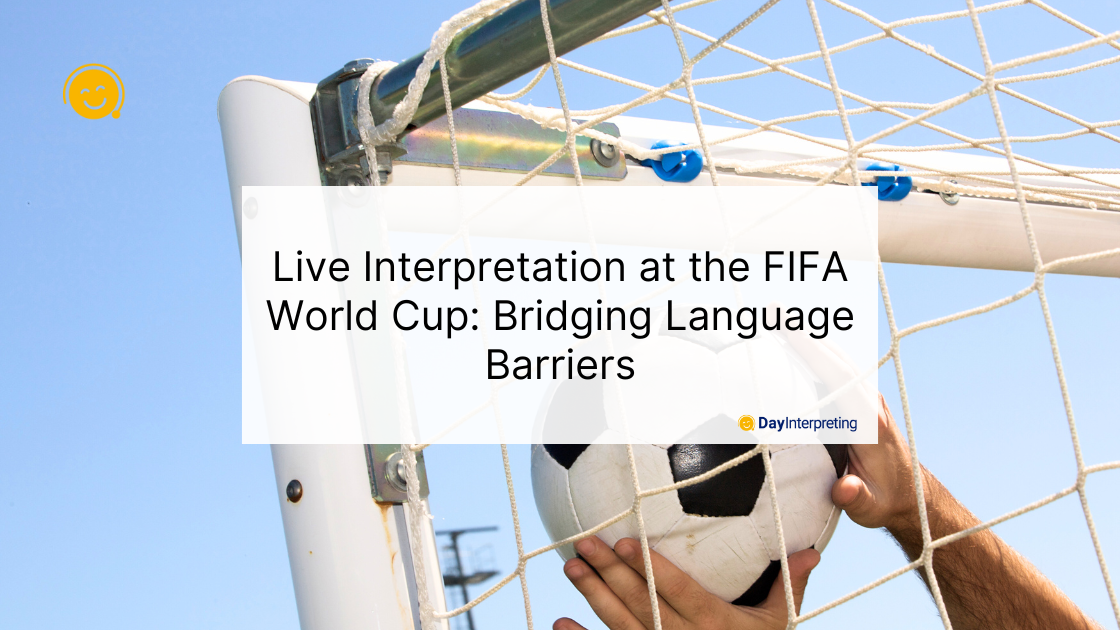In June and July of 2026, the world will once again come together for one of its most anticipated events, the FIFA World Cup. With over 3.3 million global viewers, how do organizers manage the linguistic diversity of this international extravaganza? Let’s delve into the intricacies of live interpretation at the FIFA World Cup.
The Universal Language of Soccer
Sports, often referred to as a universal language, can be understood by anyone who grasps its rules, transcending the need for verbal communication. However, the insights from commentators, press conferences, and interviews add depth to the experience. TV networks and online broadcasters understand this, investing in local commentators, professional translators, and interpreters to provide top-notch service.
Given the array of languages represented at the World Cup, this task is no small feat. While 32 countries compete for the FIFA World Cup trophy, many more tune in to watch. To cater to viewers across the globe, companies assemble a large team of simultaneous interpreters. Thanks to streaming and fast internet connections, remote interpreters can now work seamlessly during live events, ensuring a cost-effective and enjoyable experience for fans worldwide.
Live Interpreting at the FIFA World Cup: Linguistics Beyond the Field
The role of commentators, interpreters, and translators extends well beyond the 90-minute mark of each match. While most streaming services and TV companies hire local commentators for each country during the matches, interpreters come to the rescue when such resources are unavailable.
Interpreters play a crucial role in all other World Cup events, including press conferences, interviews, highlights, and more. Soccer fans want to savor every moment in their own language, and with various individuals, such as players, coaches, referees, managers, reporters, and commentators, often speaking their own languages, multiple interpreters are required to ensure comprehensive coverage. While some multilingual athletes and journalists adapt their language to accommodate the media interviewing them, it’s impossible to cater to every country’s viewership. This is where sports translators, captioners, and interpreters become invaluable during such a massive international event.
Streaming Revolutionizes Language Access
In the past, language-specific content during matches or interviews was only accessible if an interpreter was physically present on-site. This required significant expenditures by countries and TV companies. As a result, not all languages were covered due to budget constraints.
Fortunately, technology has brought about a transformation. In 2022, content was available in numerous languages, not only for the 32 participating countries but also for viewers worldwide. Streaming and TV companies maintain large teams of interpreters in different languages to meet their diverse needs. In live broadcasts, voice-over interpretation is common, but translators also work on subtitles for various content pieces, including social media posts and videos.
The Irreplaceable Human Touch
While automated translation has come a long way, live interpretation remains the preferred choice in sports. The quality, cultural nuances, and consistency provided by human interpreters are hard to replicate. With the multitude of languages and events in the World Cup, a team of professional and reliable interpreters is essential to cater to international audiences. Machine translations, while useful in certain situations, often fall short in live scenarios, as anyone who has encountered inaccurate YouTube subtitles can attest.
In the world of sports, the human touch is paramount. Given the high stakes and intensity of the sport, viewers prefer experiencing the World Cup on their own terms, with the nuances accurately conveyed. This is where specialized professionals shine.
The Art of Live Interpretation at the FIFA World Cup
Live interpretation is a challenging skill that demands a deep understanding of language and subject matter. For such a prestigious event, translators and interpreters must possess a cultural awareness of the language, employ specific jargon and terminology, and stay updated on the matches. They must also study each team and player to ensure precise and swift translations. Imagine a player using a nickname or mispronouncing a name during an interview; interpreters must swiftly adapt their translations to capture these subtleties.
As in other major sports events, the World Cup demands a high level of specialization to provide prompt and effective translations in every situation. Thanks to the dedicated work of commentators, translators, and interpreters, this thrilling event becomes accessible and enjoyable for everyone. The World Cup truly unites people across languages, bridging gaps and fostering a sense of global unity.





0 Comments